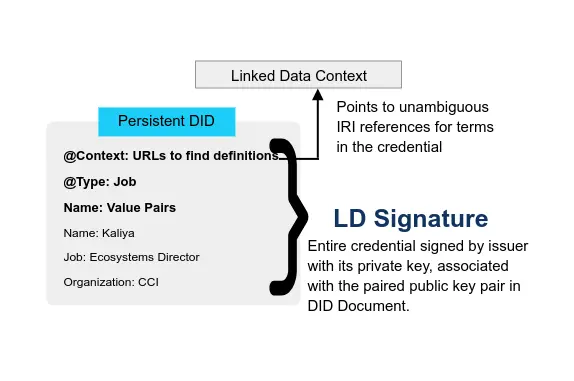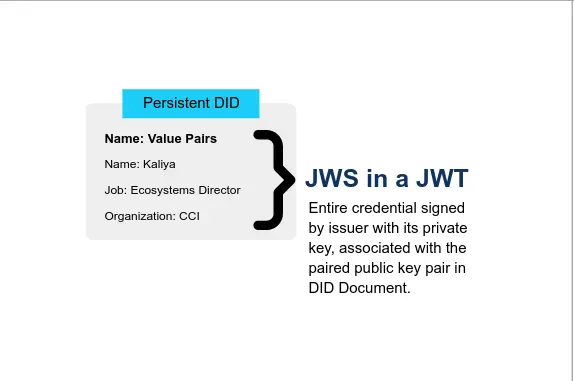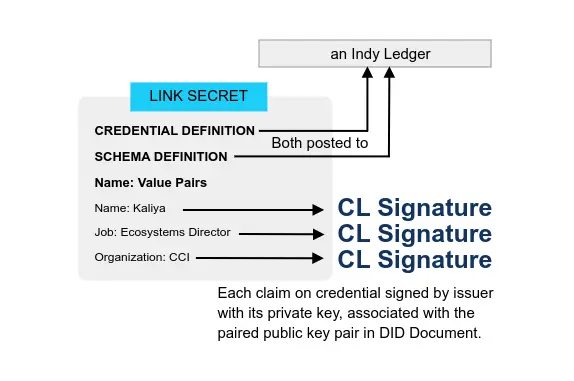Transmute
Company
Name: Transmute
Main: Website, Blog, Socials: Twitter, Youtube, Crunchbase, Linkedin, Related: DIF, DHS, Microsoft, Consensys, Oracle Founders: Eric Olszewski, Karyl Fowler, Orie Steele Founded: 2017-05-01 Location: USA, Texas, Austin Sector: Enterprise Industry: Supply Chain Projects: VCI Tech: Ethereum Standard: DID, Verifiable Credentials, OAuth, OIDCBuild a network of trust with Transmute
Transmute secures critical supplier, product, and shipment data to give customers a competitive edge in the increasingly dynamic global marketplace.
Product
- Transmute U.S. CBP Steel Tech Demo Type: Video Date: 2022-09-07
- Federated Enterprise Agents with Transmute and Okta Related: Okta Type: Post Date: 2020-04-17
- Encrypted Data Vaults Related: DigitalBazaar Type: Post Date: 2020-01-15 Tech: EDV
- Transmute ID Alpha Related: Orbit DB Type: Post Date: 2018-06-04
- Release 0: Sol Type: Post Date: 2018-06-04
- Release: The Transmute Framework Alpha Type: Post Date: 2018-03-08
The story focuses on critical trade verifiable credentials being issued, presented, and verified by trade, CBP, and PGAs.
The Okta Identity Cloud provides secure identity management with Single Sign-On, Multi-factor Authentication, Lifecycle Management (Provisioning), and more. Transmute provides a configurable Enterprise Agent enabling Decentralized Identity and Verifiable Credential capabilities for OAuth / OIDC users. Read on to learn about some of the ways Transmute and Okta enable enterprises to rapidly unlock the security benefits of decentralized identities.
EDVs allow users and companies to store data with their favorite cloud storage providers without fear of vendor lock-in, while also ensuring that the storage provider has no access to their data whatsoever. With an EDV, the client does their own encryption and decryption using keys associated with decentralized identifiers they manage, and as such, acts as the true controller of their data.
Its Phase 1 award project “Verifiable Provenance, Traceability, and Regulatory Compliance for Raw Material Imports” will adapt Transmute ID, its core technology product that leverages centralized and decentralized identity infrastructures to secure individual agency identities and verifiable credentials to ensure that CBP has visibility into the provenance, traceability and regulatory compliance of raw material imports.
One thing we learned from our Orbit DB PoC is that the DID spec offers a lot of valuable flexibility. Most DID systems achieve censor resistant decentralized storage and cryptographic decentralized identity protocols through a single identifier (hash of or full public key). We found it is possible to create a valid DID implementation that is anchored by 2 public keys, one for updating the filesystem, the other for managing the integrity of the documents, identities and claims.
This release was focused on building support for decentralized identities into centralized directory technology that is already widely adopted by enterprises. This work involved adding UI to our React dashboard and updating our API to support registration and group management. We have also done some exploratory work regarding the DID spec and LDAP integration […]
This release we focused on the centralized side of group membership. This use case relies on the integrity of the directory and discretionary access control. In other words, the directory admins can move users between groups, but users cannot control what groups they are assigned to.
The Transmute Framework helps developers build on decentralized technologies like Ethereum and IPFS via a familiar javascript interface. We support rapid prototyping by enabling developers with Redux experience to quickly build out decentralized applications.
This release focuses on support and documentation for the EventStore. Using the EventStore and the Transmute Framework, developers can save events to Ethereum and IPFS, track and query the event-sourced data models, and leverage the immutability properties of IPFS and Ethereum.
Meta
- did:(customer) Type: Post Date: 2020-10-30 Standard: DID
- Transmute Closes $2M Seed Round From Moonshots Capital, TMV, Kerr Tech Investments Related: Moonshots, TMV, KerrTech Parent: PRWeb Type: Press Date: 2020-10-21
- Transmute Closes $2M Seed Round Related: GS1, SVIP Type: Post Date: 2020-10-21
- News Release: DHS Awards $198K for Raw Material Import Tracking Using Blockchain Parent: DHS Type: Press Date: 2019-11-08
- Back to the Basics Type: Post Date: 2019-07-16 Industry: Supply Chain
- Transmute IoT Type: Post Date: 2017-06-10 Event: Mobility X hackathon at Capital Factory
- Decentralized Identifiers Market May See a Big Move: Major Giants- Consensys, Blockstack, Danube Tech Related: Transmute, Consensys, uPort, IBM, Blockstack, Danube Tech, Trinsic, Spherity, Microsoft Parent: Xaralite Type: Report
Transmute builds solutions that solve real business problems. For this reason, we support a number of different decentralized identifier (DID) methods. While we are committed to providing optionality to our customers, it’s equally important to communicate the selection criteria behind these options so that customers can consider the tradeoffs of underlying DID-methods alongside the problem set they’re solving for. Essentially, we help them pick the right tool for the job.
Closing our seed round coincides with another exciting announcement: our recent launch of Phase II work with the U.S. Department of Homeland Security, Science & Technology’s Silicon Valley Innovation Program (SVIP) to enhance “transparency, automation and security in processing the importation of raw materials” like steel.
WASHINGTON – The Department of Homeland Security (DHS) Science and Technology Directorate (S&T) has awarded $198,642 to Transmute Industries, Inc. based in Austin, TX to develop a proof-of-concept application for Customs and Border Protection (CBP) to support increased transparency, automation and security in processing the importation of raw materials such as steel, timber and diamonds raw goods entering the United States.
Several mentors have encouraged me to publicly share a more detailed account of Transmute’s choice to shift focus solely to commercializing Transmute ID, the decentralized identity component of our original product, the Transmute Platform — a Heroku-like rapid dApp builder that seamlessly bridged centralized and decentralized tech, specifically for existing enterprises.
[…]there was zero near-term enterprise demand in the token-powered functionality of the platform. We searched high and low, interviewing most of the major enterprise storage solutions out there and couldn’t even find one willing to admit that investing decentralized storage tech was on their 5 year innovation roadmap.[…]
we did uncover a demand for user-centric identity tech (e.g. increased security, privacy, portability, infinite federation/scalable, etc.) and an enormous demand for the resulting efficiency gains and untapped revenue potential of implementing a decentralized identity solution. Because these directly address problems enterprises are facing today, and they directly connect to the cost/profit levers that enterprise stakeholders care most about.
The Transmute team joined forces with other Austin hackers to participate in the first Mobility X hackathon at Capital Factory sponsored by car2go a few weekends ago where hackers were challenged to address how to handle rider demand fluctuations or ensure consistent vehicle connectivity.
Maintaining network connectivity felt like the most urgent problem to solve given an effective solution would mean more accurate data on the car2go fleets, resulting in an expanded capacity to address rider demand changes. Mesh networks have been explored as a natural solution for maintaining network connectivity among distributed assets that are moving around geographically. …
provides valuable market size data for historical (Volume & Value) from 2016 to 2020 which is estimated and forecasted till 2026*. Some are the key & emerging players that are part of coverage and have being profiled are Transmute (United States), Consensys (United States), uPort (United States), IBM (United States), Tykn Tech (Netherlands), Blockstack (United States), Danube Tech (Austria), Trinsic (United States), Spherity (Germany), Microsoft (United States).
Explainer
- Visibility 2.0: Creating Digital Consistency in an International Supply Chain Parent: NextLevelSupplyChain Type: Episode Date: 2022-08-10 Industry: Supply Chain
- Identity Terms Provide Value along the Supply Chain: How We Know When to Buy the Farm Type: Post Date: 2022-06-09 Industry: Supply Chain
- Identity in the Supply Chain Related: GS1 Parent: ViennaDigitalID Type: Video Date: 2022-01-25 Event: Vienna Digital Identity #30
- Takaways from the Suez Canal Crisis Type: Post Date: 2021-04-20 Industry: Supply Chain
- The Business Case for Interoperability Type: Post Date: 2020-05-21
- Blockchain-secured Documents for Global Trade Related: Conexus Indiana Type: Webinar Date: 2020-05-20 Industry: Supply Chain
how can something as complicated as the international supply chain take fundamental trade practices and marry them with innovation so we can move at the speed of digitization? Join us for a mind-blowing discussion with Karyl Fowler, CEO at Transmute
Jessica Tacka Supply chain credentialing in the form of bills of lading, certificates of origin, or letters of credit is used to protect honest parties and their merchandise from being confused with dishonest parties or entities that are engaged in unethical practices, such as environmental destruction, or forced labor.
Vienna Digital Identity #30 GS1 is the global association for supply chain identifiers with members across all industry sectors and interacting (unbeknownst) with general consumer on a daily basis. Transmute a foundational member of the DID/VC community and a participant in the US DHS Silicon Valley Innovation Program’s cross-border shipping use case.
Karyl Fowler Appeal for Supply Chain Agility — Powered by Verifiable Credentials The Suez Canal debacle had a massive impact on global supply chains — estimated at >$9B in financial hits each day the Ever Given was stuck, totaling at nearly $54B in losses in stalled cargo shipments alone.
For Transmute, the foundations required to technically interoperate are considered pre-competitive, and our ability to interoperate widely is a strategic feature. This feature powers a competitive advantage that ensures Transmute customers’ critical trade documents are verifiable at every step in the supply chain, regardless of where they’re stored and what blockchain they’re anchored to. Transmute customers realize maximum confidence about data integrity and access far richer insights about the health of their supply chains as a result.
On May 14th, 2020 Conexus Indiana and Transmute hosted an interactive webinar titled “Blockchain-secured Documents for Global Trade” as part of the Emerging Technology Showcase series.
Standards
- Verifiable Presentation Personas: Certifiers, Consolidators, & Submitters Type: Post Date: 2022-04-21
- DID Key Workbench Type: Page Date: 2020-11-27
- Anil John and Melissa Oh, of the Silicon Valley Innovation Program (SVIP) Related: SVIP Parent: FederalBlockchainNews Type: Episode Date: 2020-09-25 Sector: Public Industry: Supply Chain
- NFC + DIDs Type: Post Date: 2020-07-09 Industry: Supply Chain Tech: NFC
- GitHub DID Type: Page Date: 2020-05-08
- Verifiable Credentials with Transmute and Okta Related: Okta Type: Post Date: 2020-04-17
- The Element DID Method: Sidetree, Ethereum & IPFS – Orie Steele Type: Post Date: 2019-07-04 Standard: DID:Element
- Introducing Element Related: Microsoft, Consensys, DIF Type: Post Date: 2019-05-10 Tech: Ethereum Standard: DID, IPFS, Sidetree, Element
- eXtended Merkle Signature Scheme Type: Code Date: 2022-04-15
The arrow for “Issue Credentials” is exactly the same as “Send Presentation,” leading us to believe these activities are similar, but how are they similar? We can’t adequately answer these questions by looking at the above picture and the specification doesn’t provide a ton of help either…
did:key is a DID Method which is offline friendly, cryptographically self certifying, requires no trust of certificate authoritites or blockchain and is ideal for ephemeral use.
There was a significant push by large platform players and others, to set up a platform model […] sit in the middle and extract value from that platform. As a government, we are rather familiar with being walked into a corner and told that there is only one product that you will buy because it will solve the problem.
Supply chains are complicated. While over 80% of logistics companies are investing in digitization to bring their supply chains into the 21st century, at the end of the day, not every step along the way can be web-enabled.
Transmute has been working on a solution: tying DIDs to Tangem NFC Cards, which carry a passport-grade secure chip, which implements public key cryptography. Near Field Communication (NFC) is the technology that enables things like contactless payments […] increasingly used in supply chains for things like inventory and warehouse management
Decentralized Identifiers (DIDs) are a new type of identifier for verifiable, “self-sovereign” digital identity. DIDs are fully under the control of the DID subject, independent from any centralized registry, identity provider, or certificate authority. DIDs are URLs that relate a DID subject to means for trustable interactions with that subject. DIDs resolve to DID Documents — simple documents that describe how to use that specific DID. Each DID Document contains at least three things: cryptographic material, authentication suites, and service endpoints. Cryptographic material combined with authentication suites provide a set of mechanisms to authenticate as the DID subject (e.g., public keys, pseudonymous biometric protocols, etc.). Service endpoints enable trusted interactions with the DID subject.
Okta provides a mechanism for adding custom claims to id_tokens and access_tokens: Hooks and Custom Authorization Servers. These components can enable automated integrations with emergent technology including decentralized identifiers and verifiable credentials.
Supply chain logistics companies are particularly interesting with how they manage their extended business networks as they compete for new business. This includes faster and safer on-boarding of customers and third-party vendors, and new ways to manage the lifecycle and associated data of those relationships.
Transmute is excited to announce Element, an implementation of the Sidetree Protocol on top of Ethereum and IPFS. This work was done in collaboration with Microsoft and Consensys under the Decentralized Identity Foundation (DIF)
We’ve been working on generating test vectors for:
https://datatracker.ietf.org/doc/html/rfc8391
That we could use to register thektyandalgfor XMSS such that it
could be used by JOSE and COSE.
https://GitHub.com/Transmute-industries/xmss
I’ve reached the limits of my ability to move this ball forward, and am
here to ask for help.
I’m not very good with GoLang, and the original xmss source I am basing
this on is difficult for me to extend.
Resources
- Verifiable Actions for signing and verifying VCs with DIDs Type: Post Date: 2022-03-21
- Element Block Explorer Type: Post Date: 2019-07-10 Tech: Element
This weekend I worked on making a GitHub action that can sign and verify verifiable credentials with decentralized identifiers.
We’ve made some serious upgrades to the Element-lib which is the javascript library we use to implement the Element DID. As we mentioned in our last post here, Element is a Sidetree Protocol based DID Method that relies on Ethereum and IPFS. Our implementation is unique in that we provide a JavaScript library that runs in both the browser and node.js, in addition to providing a server-based REST API.
Our first implementation of Element enabled users to anchor their DID directly via a MetaMask-powered DApp thanks to Infura, and also use our “Full Node” to submit operations. Supporting both modes introduced a lot of complexity, and highlighted some scalability issues which we’ve recently fixed.





